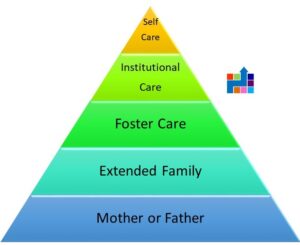A community-based model program for orphan children focuses on providing care, support, and opportunities within a community setting, rather than in institutional orphanages. This approach aims to integrate orphaned children into the community, ensuring they have a family-like environment, access to education, healthcare, and opportunities for personal development. Here’s an overview of the key components and benefits of such a program:

Key Components of a Community-Based Model Program
Family-Based Care:
Foster Care: Place orphaned children in the care of foster families who are trained and supported to provide a nurturing environment.
Kinship Care: Support extended family members (relatives) who are willing to take in orphaned children.
Adoption: Facilitate legal adoption processes for children to find permanent families.
Community Integration:
Education: Ensure access to quality education by enrolling children in local schools and providing academic support, scholarships, and school supplies.
Healthcare: Provide access to healthcare services, including regular medical checkups, vaccinations, and mental health support.
Recreational Activities: Encourage participation in community activities such as sports, arts, and cultural events to promote social integration and personal development.
Psychosocial Support:
Counseling Services: Offer individual and group counseling to help children cope with trauma, loss, and emotional challenges.
Mentorship Programs: Connect children with mentors who can provide guidance, support, and positive role models.
Economic Support for Caregivers:
Financial Assistance: Provide financial support to foster and kinship families to cover the costs of child-rearing.
Income Generating Activities: Offer training and resources for caregivers to engage in income-generating activities to improve their economic stability.
Capacity Building and Training:
Caregiver Training: Train foster and kinship caregivers on child care, child rights, and positive parenting practices.
Community Awareness: Conduct awareness campaigns to reduce stigma and encourage community support for orphaned children and their caregivers.
Monitoring and Evaluation:
Regular Assessments: Conduct regular assessments to monitor the well-being of the children and the effectiveness of the program.
Feedback Mechanisms: Establish channels for feedback from children, caregivers, and community members to improve the program continuously.
Benefits of a Community-Based Model Program
Stable and Nurturing Environment: Provides children with a stable, loving environment that promotes emotional and psychological well-being.
Social Integration: Helps children build social relationships and integrate into the community, reducing the stigma associated with being an orphan.
Holistic Development: Addresses various aspects of a child’s development, including education, health, social skills, and emotional well-being.
Family and Community Involvement: Engages families and the community in the care and support of orphaned children, fostering a collective responsibility.
Cost-Effective: Often more cost-effective than institutional care, as it leverages existing community resources and infrastructure.


1 Comment